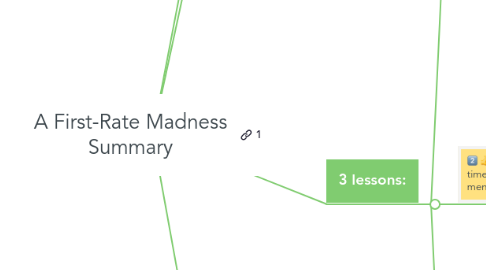
1. Who would I recommend the A First-Rate Madness summary to?
1.1. The 29-year-old who is depressed and feels like there isn’t anything good about herself, the 44-year-old who has a child with bipolar disorder and is losing hope for their future, and anyone who is a student of history or psychology.
2. 1-Sentence-Summary:
2.1. A First-Rate Madness shares the stories of many world leaders and explains how they prevailed despite their mental illnesses and struggles, showing you how to turn your psychological disadvantages into leadership strengths.
3. Favorite quote from the author:
3.1. "In times of crisis, we are better off being led by mentally ill leaders than by mentally normal ones." - S. Nassir Ghaemi
4. 3 lessons:
4.1. The benefits of illnesses like bipolar disorder and depression can be good to have as a leader.
4.1.1. The serious and devastating nature of depression and anxiety makes us easily ashamed of them.
4.1.2. But there’s hope in the abilities that mentally unwell individuals have that others don’t.
4.1.3. Major Depressive Disorder, or more commonly known as depression, is, for simplicity’s sake, like a deep, unbreakable sadness.
4.1.4. Ghaemi claims that because of what most people with depression feel, or sometimes don’t feel, they are more empathetic.
4.1.4.1. People who are depressed can thus better understand the difficulties of human experience.
4.1.5. Bipolar Disorder, on the other hand, is when people experience depressive episodes but also manic periods as well.
4.1.5.1. They may oscillate between sadness and euphoria frequently, even within hours.
4.1.5.2. Often spontaneous, these people have heightened moods on both ends of the spectrum.
4.1.6. People with Bipolar Disorder spend time in the outlier regions of emotional highs and lows, where most other people never go.
4.1.6.1. Ghaemi believes that because of this, they’re more likely to see things from those outlier perspectives.
4.1.6.2. They may be more creative than the rest of us.
4.2. Nations have made it through difficult times throughout history because of their mentally ill leaders.
4.2.1. Did you know that Martin Luther King Jr. and Gandhi both tried to commit suicide when they were young?
4.2.1.1. The two of them suffered from depression that started in childhood.
4.2.2. Later in life, it appears that the stresses they had made their mental state worsen.
4.2.2.1. This makes sense knowing the great changes each of these individuals brought about in the world.
4.2.3. Consider the heightened sense of compassion that depressed people have.
4.2.3.1. The civil rights movements of King and Gandhi both were, at their core, just radical empathy. Both of these great men highlighted the importance of love above all else.
4.2.3.2. They knew of the despair that others were feeling because they had felt it themselves.
4.2.3.3. Their level of concern for others is well-summarized by a quote from King: “Darkness cannot drive out darkness; only light can do that. Hate cannot drive out hate; only love can do that.”
4.2.4. Winston Churchill was another case of a depressed leader making better decisions because of his illness.
4.2.4.1. In 1938 British Prime Minister Neville Chamberlain heroically declared that he would meet with Hitler directly. Chamberlain hoped to persuade Hitler that war wasn’t necessary.
4.2.4.2. Churchill, on the other hand, was more realistic because of his depression. His sound mind helped him make better decisions throughout his leadership.
4.2.5. John F. Kennedy exhibited many of the symptoms of Hyperthymic Personality Disorder, which is similar to Bipolar Disorder.
4.2.5.1. During the Cuban Missile Crisis, Kennedy held his position when everyone else told him to call for a pre-emptive nuclear strike. Because of his mental illness, he successfully averted a nuclear catastrophe.
4.3. Recognizing that mental illness has its good sides is a step toward breaking the stigma around it.
4.3.1. Mental illness continues to be a taboo subject in many places around the world. While many people are breaking free of the stigma, countless others continue to struggle in silence.
4.3.2. It only makes sense for society to be afraid of something they can’t understand.
4.3.3. But we must stop the progression of mental illnesses, and the spread of the stigma around it.
4.3.3.1. This is where these upsides we’ve discussed come in handy.
4.3.4. First, we need to accept the mentally unhealthy states of some of our past leaders. We must admit the positive contributions these individuals made despite their challenges.
4.3.5. Those with illnesses like depression and Bipolar Disorder have made a difference in the world.
4.3.5.1. Society is a better place because of the decisions of these leaders which were influenced by their mental illnesses.
4.3.6. From here, we can see that anyone, regardless of mental state, can make a positive contribution to society.
4.3.6.1. Depressed or anxious people, those with Bipolar or eating disorders, and all who struggle with mental illness can change the world.
4.3.7. By acknowledging these facts, more will admit that they need help. And when people accept their weakness, they can start the first steps to healing and recovery.
